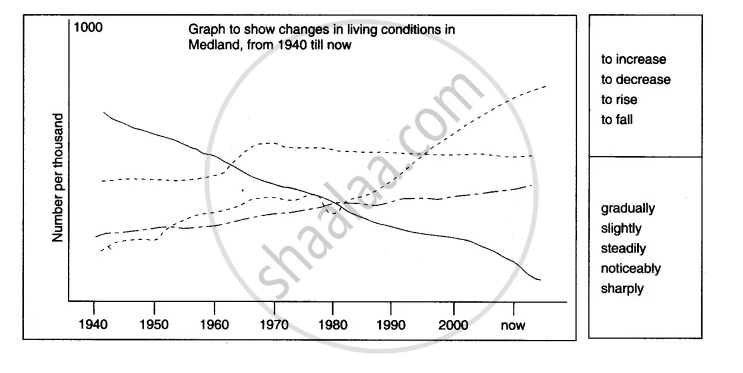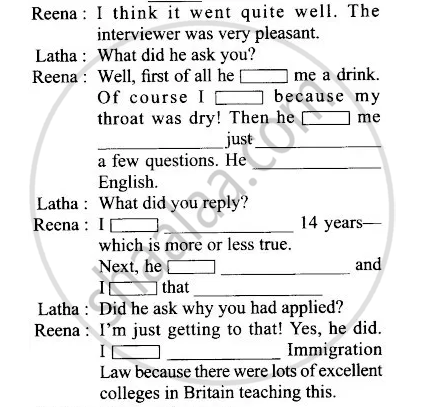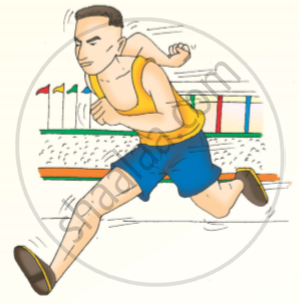Advertisements
Advertisements
प्रश्न
Answer the following questions briefly:
(a) In 1953, Hooper was a favoured young man. Explain.
(b) They said that they would create a desk job for Hooper at headquarters.
- Who are ‘they’?
- Why did they decide to do this?
(c) Duke was an extraordinary dog. What special qualities did he exhibit to justify this? Discuss.
(d) What problems did Chuck present when he returned to the company headquarters?
(e) Why do you think Charles Hooper’s appointment as Assistant National Sales Manager is considered to be a tribute to Duke?
उत्तर
(a) The year 1953 had been quite an auspicious year for Hooper. This youngman of six-feet- one-inch,’played in the university football team. He was already a ‘hard-charging’ zone sales manager for a chemical company. He was a man of highly competitive nature and always had a big genuine grin of satisfaction over his face. He was a favoured youngman liked by all. Everything was going well for him.
(b) They were men from Hooper’s chemical company. After the fifth week of the accident, some men from his company came to the hospital and told Hooper to take a year off
- Hooper’s company told him to take a year off. They also promised to create a desk job for him at headquarters. A man in a wheelchair with paralysed arm and leg couldn’t do the mobile job of a ‘hard- charging’ zone sales manager. Hence, a desk job was especially created for him at headquarters.
(c) Duke was a four year old Dobermann pinscher weighing 23 kilos. Chuck Hooper liked Duke for his energy and cheerfulness. Duke knew what he had to do for Hooper.
Once while jumping he hit Hooper about the belt, causing him to fight to keep his balance. He never jumped on Chuck Hooper again. With Hooper standing, the dog walked to the end of the leash and tugged steadily. Leaning against the pull, Hooper learned to keep his balance. In this way, Duke helped Hooper to go on for short walks.
(d) Chuck’s company had created a especial desk job for him. But when he returned to the company’s headquarters, this move created some problems. Chuck was fighting very hard for his come back. The people there didn’t know that Hooper had already set his next objective: ‘March 1, a full day’s work’. But no one dared to tell him that he couldn’t do justice to his job as a salesman. He couldn’t move properly and worked only an hour a day.
APPEARS IN
संबंधित प्रश्न
Answer the following question:
Describe Mr. Bramble as he has been described in the story.
c
I chatter, chatter, as I flow
To join the brimming river,
For men may come and men may go,
But I go on for ever
(a) Who does ‘I’ refer to in the given lines?
(b) How does it ‘chatter’?
(c) Why has the poet used the word ‘brimming’? What kind of a picture does it create?
(d) Explain the last two lines of the stanza.
The poem is full of images that come alive through skilful use of words. Describe
any two images that appeal to you the most, quoting the lines from the poem.
Discuss in groups
What would you do in the following situations? Give reasons for your answer
If you were travelling by bus and you saw someone pick another passenger's
pocket.
- If you found a wallet on the road.
- If you were in a shop and you saw a well-dressed lady shoplifting.
- If your best friend is getting involved with an undesirable set of friends.
- If you were in school and you saw one of your class-mates steal another child's
pen.
Now write three situations similar to (a) in the box. Exchange the information with your partner and guess the answer to each other's situations as in (b).
Question 1.
My dog is barking angrily and is trying to get loose.
Question 2.
The car is making a curious noise.
Question 3.
Satish enters breathing heavily.
Satish enters breathing heavily.
(4)

In Units 1 and 2 you learnt and practised the skill of deducing the meanings of new words by using other words in the given context. Now use that skill to deduce the meanings of words in the article you have read. Here is an example.
(a) They are solitary creatures with the exception of the mothers and calves and breeding pairs, although they sometimes congregate at bathing places.

Deduce the meanings of the following words from the passage you have just read, using other words in the context to help you. Copy and complete the following :
| Word | Words/clues that helped me | what I think the word means | what the dictionary says | were you (✓) (tick mark) or (x) |
| confined | ||||
| ranged | ||||
| overlapping | ||||
| bobbing | ||||
| olfactory | ||||
| aggregation | ||||
| plummeting | ||||
| mortality | ||||
| vulnerable | ||||
| poached |
Write what each symbol means using can, can’t, must, mustn’t.

Reported speech in Extended practice.
Read the dialogue between Mr Coomer (Mr C), the British Scholarship Officer, and an applicant, Miss Reena Banerjee (R).
Mr C : Come in, Miss Banerjee.
R : Thank you.
Mr C : Please sit down. Can I get you a cup of coffee or a cold drink?
R : Yes thank you. A cold drink, please.
Mr C : I’m just going to ask you a few questions. How long have you been studying English?
R : I’ve had private as well as school lessons for 14 years.
Mr C : Just as background information, what do you do in your spare time?
R : I’ve always enjoyed drama, and also debating.
Mr C : Why do you wish to obtain a scholarship to study in Britain?
R : Well, I’m interested in studying Immigration Law, and there are several good colleges in Britain dealing with his.
Mr C : Very interesting. Finally, do you know that the grant only covers teaching fees?
What about your living expenses?
R : My sister will pay for my personal expenses.
Mr C : Well, Miss Banerjee, we’ll be writing to you next week. Thank you for coming.
Reena meets her friend, Latha, after the interview. She is very excited and tells Latha exactly what happened. Fill in the spaces using reported speech.
Fill in the [boxes] with reporting verbs.


Given below is some information about Jesse Owens, one of the most famous athletes of all times. His friend is planning to write his biography. Using information from the table, complete the biography. (The first gap has been completed for you, as an example.)

James Cleveland Owens (J.C. Owens) became famous as Jesse Owens
| 1913 | Birth, Alabama, USA. |
| 1934 | After First World War - goes to school, teachers recognise and develop his athletic talents. |
| 1935 | Six world records |
| 1936 | Berlin Olympics, four gold medals |
| 1950 | Sports experts vote him Greatest Track Athlete of the half Century. |
| 1960 | Another athlete breaks Owens' last Olympic record . |
| 1980 | Dies oflung cancer. |
Jesse Owens was born in Alabama USA, in 1913. He was the youngest often children, and the family lived in a cramped shanty house. After the First World War, the family moved to Cleveland, where his school (1)__________ his talents. He quickly became a local hero. Soon afterwards he gained a place not only at the Ohio State University, but also in the US Olympics team.
On 25th May 1935, Jesse Owens performed athletics' greatest feat when he (2) _________ at the Ohio state University Athletics Championships. A year later, at the Berlin Olympics, his greatness was confirmed; he (3) __________ for 100m, 200m, long jump and sprint relay.
Because of his achievements in track and field events, in 1950 he (4) _______ .His last Olympic record (5) ___________ only in 1960. This great athlete (6) ______________ 1980.
Rearrange the following words and phrases to form meaningful sentences. The first one has been done for you as an example.
was/ about twenty / childhood / delight / years ago.
Childhood was a delight about twenty years ago.
(a) the leisure hours/of a child/ of the TV / today / are spent / in front
________________________________________________
(b) of most / now – a – days / the attitude / parents is / different
________________________________________________
(c) work and play / different things / they see / as / two
________________________________________________
(d) playing / feel / is a / waste of / they / time / that
________________________________________________
